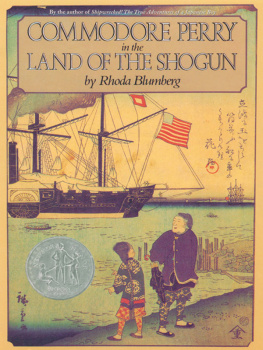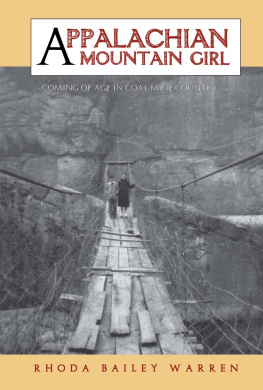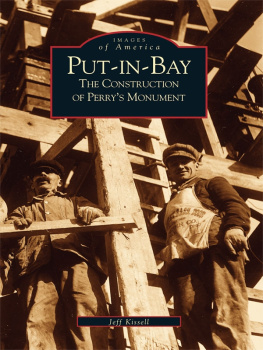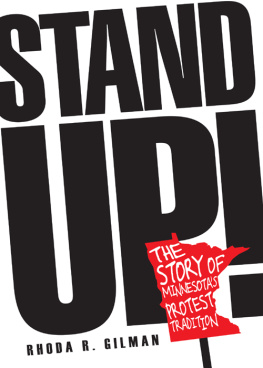Rhoda Blumberg - Commodore Perry in the Land of the Shogun
Here you can read online Rhoda Blumberg - Commodore Perry in the Land of the Shogun full text of the book (entire story) in english for free. Download pdf and epub, get meaning, cover and reviews about this ebook. year: 2009, publisher: HarperCollins, genre: History. Description of the work, (preface) as well as reviews are available. Best literature library LitArk.com created for fans of good reading and offers a wide selection of genres:
Romance novel
Science fiction
Adventure
Detective
Science
History
Home and family
Prose
Art
Politics
Computer
Non-fiction
Religion
Business
Children
Humor
Choose a favorite category and find really read worthwhile books. Enjoy immersion in the world of imagination, feel the emotions of the characters or learn something new for yourself, make an fascinating discovery.
- Book:Commodore Perry in the Land of the Shogun
- Author:
- Publisher:HarperCollins
- Genre:
- Year:2009
- Rating:3 / 5
- Favourites:Add to favourites
- Your mark:
- 60
- 1
- 2
- 3
- 4
- 5
Commodore Perry in the Land of the Shogun: summary, description and annotation
We offer to read an annotation, description, summary or preface (depends on what the author of the book "Commodore Perry in the Land of the Shogun" wrote himself). If you haven't found the necessary information about the book — write in the comments, we will try to find it.
Commodore Perry in the Land of the Shogun — read online for free the complete book (whole text) full work
Below is the text of the book, divided by pages. System saving the place of the last page read, allows you to conveniently read the book "Commodore Perry in the Land of the Shogun" online for free, without having to search again every time where you left off. Put a bookmark, and you can go to the page where you finished reading at any time.
Font size:
Interval:
Bookmark:

For my husband, Gerald
and my son, Lawrence
I want to thank my friend Dorothy Segall, who helped me
acquire some of the illustrations and supplied me with source
material from her private library.
Im also grateful for the guidance of another dear friend
Amy Poster, Associate Curator of Oriental Art
at the Brooklyn Museum.
The Coming of the Barbarians
Aliens Arrive
The Black Ships of the Evil Men
His High and Mighty Mysteriousness
Landing on Sacred Soil
The Audience Hall
The Dutch Island Prison
Foreigners Forbidden
The Great Peace
Clouds Over the Land of the Rising Sun
The Japanese-American
The Return of the Barbarians
The Black Ships Return
Parties
The Treaty House
An Array of Gifts
The Grand Banquet
The Treaty
A Japanese Feast
Excursions on Land and Sea
A Birthday Cruise
Shore Leave
In the Wake of the Black Ships
Letter of the President of the United States to the Emperor of Japan
Translation of Answer to the Presidents Letter, Signed by Yenosuke
Some of the American Presents for the Japanese
Some of the Japanese Presents for the Americans
Text of the Treaty of Kanagawa


Steamships were new to the Japanese.
courtesy of Asahi Shimbun and Kanagawa Prefecture Museum

The Black Ships arrive, July 8, 1853.
courtesy of the Historiographical Institute of the University of Tokyo
I F MONSTERS HAD DESCENDED UPON J APAN the effect could not have been more terrifying.
People in the fishing village of Shimoda were the first to spot four huge hulks, two streaming smoke, on the oceans surface approaching the shore. Giant dragons puffing smoke, cried some. Alien ships of fire, cried others. According to a folktale, smoke above water was made by the breath of clams. Only a child would believe that. Perhaps enemies knew how to push erupting volcanoes toward the Japanese homeland. Surely something horrible was happening on this day, Friday, July 8, 1853.
Fishermen pulled in their nets, grabbed their oars, and rowed to shore frantically. They had been close up and knew that these floating mysteries were foreign ships. Black ships that belched black clouds! They had never seen anything like it. They didnt even know that steamboats existed, and they were appalled by the number and size of the guns.
Barbarians from out of the blue! Will they invade, kidnap, kill, then destroy everything? What will become of the sacred Land of the Rising Sun?
General alarms were sounded. Temple bells rang, and messengers raced throughout Japan to warn everyone that enemy aliens were approaching by ship.
Rumors spread that one hundred thousand devils with white faces were about to overrun the country. People panicked. They carried their valuables and furniture in all directions in order to hide them from invading barbarians. Women and children were locked up in their homes or sent to friends and relatives who lived inland, far from the endangered shore.
Messengers rushed to the capital of Edo (now Tokyo) to alert government officials. Edo, the worlds largest city with more than one million occupants, went into a state of chaos the very day the ships were sighted. Women raced about in the streets with children in their arms. Men carried their mothers on their backs, not knowing which way to turn.
Who could control the turmoil? The Emperor Komei was isolated in his royal palace at Kyoto. Although he was worshiped as a divine descendent of the sun goddess, Amaterasu, he was a powerless puppet, responsible primarily for conducting religious ceremonies. During his leisure hours he was expected to study the classics and compose poetry. The Japanese referred to their emperor as he who lives above the clouds. By law, he was not permitted to leave his heavenly palace unless he received special permission from the government. An emperors sphere of influence was otherworldly. All down-to-earth decisions were made by shoguns who had been wielding power for more than 700 years.
The word shogun means barbarian expelling generalissimo. How appropriate at this time! Surely the Shogun would take command!
But Shogun Ieyoshi who occupied the palace at Edo in 1853 was a weakling. No one even bothered to tell him the frightening news. Three days after the ships arrived he over-heard chatter about them while enjoying a Noh play that was being performed for him in his palace. The news affected him so badly that he went to bed, sick at heart.
Because the Shogun was inept, his councillors, called the Bakufu , ruled the country. But according to a Japanese reporter, They were too alarmed to open their mouths. The Bakufu should not have been so surprised. Before reaching Japan the American fleet had stopped at Loo Choo (now Okinawa). Japanese spies stationed there had sent word that American ships were on their way to Japan. Dutch traders had also alerted the Bakufu. But for mystifying reasons, the government did not take these reports seriously until the Black Ships arrived on July 8. After recovering from shock they ordered the great clans to prepare to battle barbarians.
Locked away from the rest of the world, using the Pacific Ocean as its moat, Japan had maintained a feudal society similar to that of Europe during the Middle Ages. There were lords ( daimyos ), knights ( samurai ), and vassals who labored in their lords domain and paid tithes to their masters.

A samurai readies for battle.
courtesy of the Metropolitan Museum of Art, Bashford Dean Memorial Collection
The country had not been at war since it invaded Korea in 1597. That was 256 years earlier. Nevertheless, feudal lords were able to mobilize troops. Men who had never dressed for warfare worked to get rust off spears. They placed new feathers in their families antique arrows. Tailors were pressed into service so they could fix the silk cords on ancient armor, make warriors cloaks, and sew cotton skull-caps that would cushion the weight of heavy helmets. Seventeen thousand soldiers were readied for battle.
When the ships moved toward land that first day, Japanese guard boats set out to surround the enemy. But they could not catch up with aliens whose ships were so magical that they steamed ahead against the wind without using sails or oars.
At five oclock in the afternoon the foreign ships anchored a mile and a half from shore, at Edo Bay. They were less than thirty-five miles from the capital city. Beautiful cliffs, rolling green hills, and, above all, snow-capped Mount Fuji made a breathtaking scene. After dusk, beacon fires dotted the land, and there was an incessant toll of temple gongs.
That night a meteor with a fiery tail streaked through the sky like a rocket. An omen from the gods! Shrines and temples were jammed. Priests told worshipers that barbarians were about to punish them for their sins.
Font size:
Interval:
Bookmark:
Similar books «Commodore Perry in the Land of the Shogun»
Look at similar books to Commodore Perry in the Land of the Shogun. We have selected literature similar in name and meaning in the hope of providing readers with more options to find new, interesting, not yet read works.
Discussion, reviews of the book Commodore Perry in the Land of the Shogun and just readers' own opinions. Leave your comments, write what you think about the work, its meaning or the main characters. Specify what exactly you liked and what you didn't like, and why you think so.











